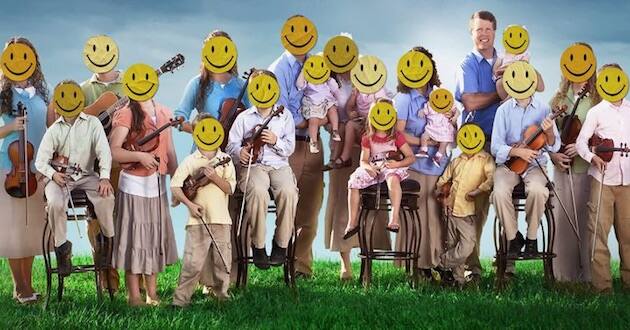I found myself both frustrated and mesmerized by the new Amazon Prime documentary “Shiny Happy People: Duggar Family Secrets.”
But all was not well in DuggarWorld. In 2015, Josh Duggar publicly apologized for having “acted inexcusably” following reports he molested five girls, including some of his sisters, by fondling them. TLC announced that the show was officially canceled and would not resume production. A spin off show, “Counting On,” aired in December 2015 and was cancelled in 2021, due to Josh Duggar’s arrest for child pornography. He was sentenced to 12 years in prison for his crimes.
All of this has, of course, been tabloid fodder for the past dozen years. In the beginning it was a “feel-good” story of a large and happy family, and more recently it was a train wreck from which we could not avert our eyes.
The problem with treating the story as tabloid fodder, which this new documentary continues to do, is that it will likely prevent the church from dealing with important issues.
For example, “Shiny Happy People” either ignored or edited out reasonable voices that could have added much insight and nuance to this story. The very subtitle, “Duggar Family Secrets,” suggests that what was in the documentary was previously not known, or had been somehow silenced by a powerful fundamentalist or evangelical cabal.
That impression ignores the work I did for WORLD Magazine covering Bill Gothard (who ends up being the real “star” of “Shiny Happy People”) in 2014 and 2015. (Examples of which you can find here and here.) Christianity Today deserves even more credit. It was doing important and appropriately critical coverage of Gothard as early as the 1980s. (You can read the nearly 100 articles CT did on Gothard over the years here.)
I don’t know if the reporters for Christianity Today received calls from the producers of “Shiny Happy People” to add perspective and journalistic gravitas to the series. I know I did not. This failure is a huge hole in the credibility of “Shiny Happy People,” especially since Gothard himself was represented only in archive footage. I, on the other hand, actually interviewed Gothard during the era covered by the documentary. (You can read a portion of that interview here.)
Perhaps most conspicuous in her absence was Jinger Duggar, who has written an excellent and nuanced book about her time in DuggarWorld, and about the influence of Bill Gothard and the Institute for Basic Life Principles on her family. Her book is Becoming Free Indeed and I recommend both the book and this excellent interview she did with my friend and former Colson Center colleague Shane Morris.
In fairness to the producers, they apparently did try to get Jinger Duggar in the series. Jinger released a statement to that effect:
“I was actually approached and asked to participate in the docuseries, but I thought that from my perspective, I really wanted to make sure that I was able to share my story in my own words and in my own timing…. I wanted to be able to share it in a way that was God-honoring and hopefully sharing my story in a balanced way.”
I respect her decision. Perhaps she could tell that the filmmakers were interested in eyeballs and outrage, not introspection and solutions. Still, her voice — and other voices like hers — were sorely missed in this documentary.
Another problem with the series was the producers’ inability to differentiate between various tribes within evangelicalism and fundamentalism. The documentary tried to suggest that the Duggars and Gothard were at the center of a vast network of organizations that included TeenPact, Patrick Henry College, the Family Research Council, Generation Joshua and the Home School Legal Defense Association, and others. The documentary did not include interviews or statements from any of these organizations, though their critics — including Alex Harris, Josh Pease, and Kristin du Mez — were on full display.
So what should Christians learn from this docuseries aside from the basic facts about the Duggars and Gothard, facts which were already well-known? I think there are some important lessons.
First, the popularity of this series should not be a surprise. “The Rise and Fall of Mars Hill” had similar popularity (and was much more knowing about the Christian sub-culture). The recent Hillsong documentaries also generated considerable attention. They suggest that not just evangelicals, but all Americans, are interested in these stories.
Secondly, and closely following on the first, is the hard reality that if Christians do not tell these stories in redemptive ways, others will tell them in ways that are not so redemptive. The story told in “Shiny Happy People” needs to be told. Unfortunately, it still needs to be told.
Thirdly, just because “Shiny Happy People” told the story of Gothard and the Duggars imperfectly and sensationally, that doesn’t mean we shouldn’t be humble and sober about the lessons this story can teach us. Russell Moore, in his reflections on “Shiny Happy People,” points out that there is a difference between the “power of the gospel, and the gospel of power.” He’s right. “Shiny Happy People” is not so concerned about the power of the gospel (alas), but it does lay bare the gospel of power, and we should not look away.
That’s why, for all its flaws, I still recommend “Shiny Happy People.” For all that it gets wrong about American Christianity, it gets enough right to merit our time and attention. It’s my prayer that it moves us to lament, repentance, and resolve to do better.
–Warren Cole Smith | Warren previously served as Vice President of WORLD News Group, publisher of WORLD Magazine, and Vice President of The Colson Center for Christian Worldview. He has more than 30 years of experience as a writer, editor, marketing professional, and entrepreneur. Before launching a career in Christian journalism 25 years ago, Smith spent more than seven years as the Marketing Director at PricewaterhouseCoopers.
